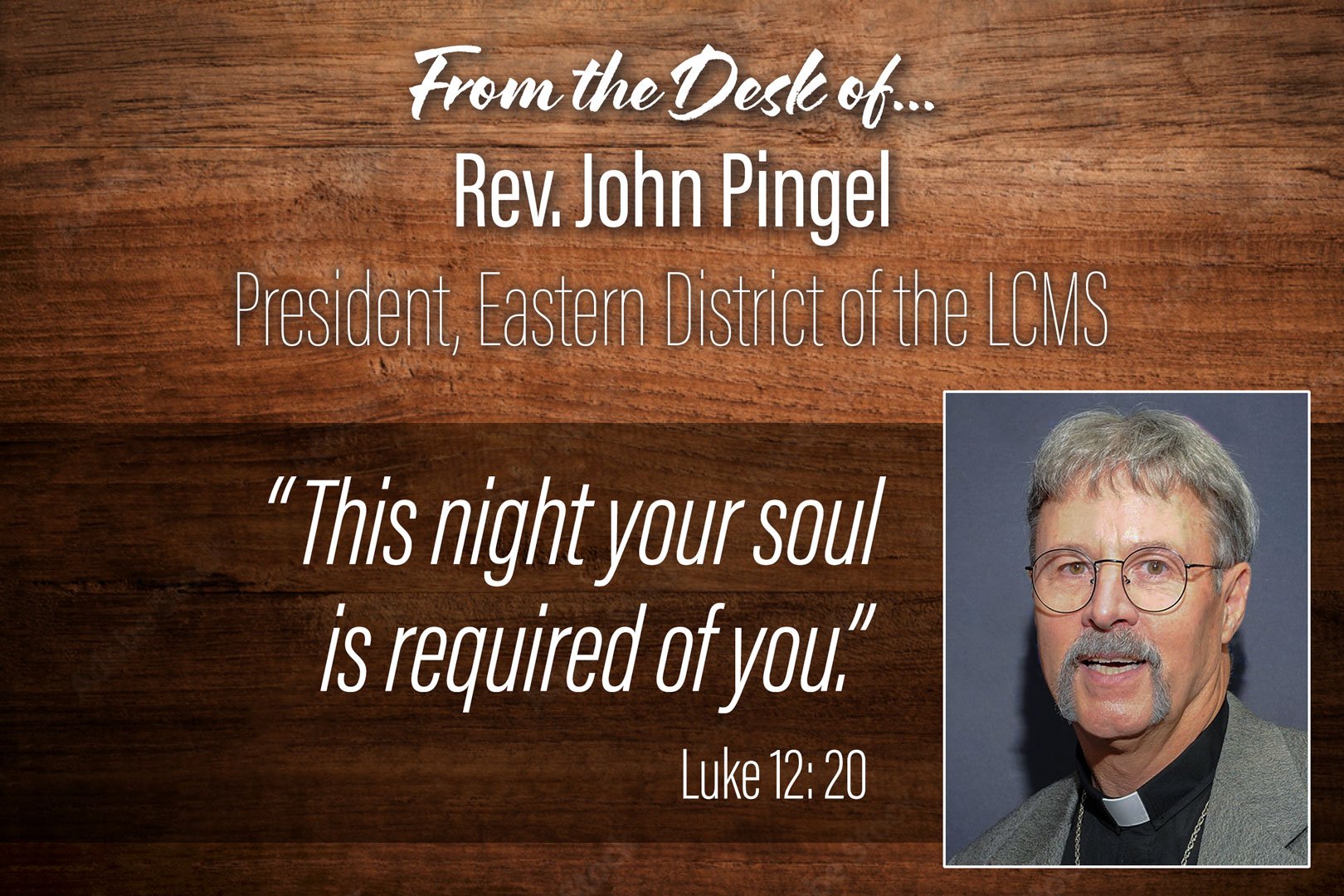From the Desk of President Pingel
“This night your soul is required of you.” Luke 12: 20
What are the most sobering words in the world? By “sobering” I mean words that cause us to stop in our tracks and do some honest evaluating of our lives -- where we’ve been, where we’re at, our hopes and dreams for the future. So … what are the most sobering words in the world? I believe I have found them, not surprisingly, right here in my Bible! Words spoken to a man in the prime of life, living a busy life, enjoying what most would consider enviable success … a man who had BIG PLANS for the future.
It all came to a grinding halt one night. God said to the man: “Time’s up. Come with me.” What took him? A sudden heart attack? A burst aneurism? A stroke? It doesn’t say. But God called. And whether he was ready or not ready, make no mistake, he went.
Jesus was in the process of teaching his followers on how to live courageously in the face of adversity. “Don’t be afraid of those who can kill the body but cannot kill the soul” he told them.“ Acknowledge me before men and I will acknowledge you before the Father.” In the middle of his teaching, he was interrupted by a man with far more “important” things on his mind -- relatives squabbling over an inheritance. In those days, the oldest brother received something like 2/3 of what was left behind. The rest got divided up by the other brothers. Unequal shares were often allotted, which made the situation ripe for envy and jealousy. Disputes were common, and the local rabbi was often dragged in to settle the dispute. Jesus, the traveling rabbi, was conveniently approached on this matter. His response was basically “Don’t put me in the middle of your family squabble.” Jesus seized upon the situation to teach a lesson on life, and death, and the RELATIVE VALUE of material possessions.
The story Jesus told was about a man who was rich. He owned a bunch of land that produced a very good crop. In those days, grain was the equivalent of cash. This man was rich and he had just gotten richer. In fact, he was the envy of all! He had more grain than his barns could hold!
Notice, in his mind, there was no question as to whether his wealth would last … or whether HE would last! And so he says to himself (v. 18): “I know what I will do. I’ll build bigger barns.” A typical solution. A construction program to solve my storage problem. Plus, it will show everyone in town what a successful man I am! I’ll be the toast of the town! And so the rich man builds his barns, and leans back in his fancy recliner. I’m all set, he reasons. I’ve got plenty of good things laid up for many years. I can take life easy, eat, drink and be merry. Let famine come! Let the economy go south! Let the market tank! I’m prepared! I’m self-sufficient! No thought of the needy. No thought of neighbor. No thought of … God.
In the middle of the night, God speaks. “Hey, rich man.” A voice from God himself? Or an emissary? The Grim Reaper, perhaps. Like the one in “A Christmas Carol.” “The Ghost of Christmas Future”—bony finger sticking out from his cowl.
God: “Hey, Rich Man.”
Rich Man: “You talking to me?”
God: “Yeah, I’m talking to you. Come with me.”
Rich Man: “But you don’t understand! I’ve got BIG PLANS!”
God: "Fool. You don’t get to call the shots. I call the shots. Come along.”
You see, it really doesn’t matter what took him or how the message was delivered. The fact of the matter is, he wasn’t prepared. His first mistake was thinking that HE was in the driver’s seat, the arbiter of his own destiny! But God said: “This night. Your soul. Required of you.”
The word used here in the original Greek carries with it the idea of a LOAN which now must be repaid … in this case, to God. The subsequent question God asks the man in the story is sobering, too. “Then who will get what you have prepared for yourself?” The answer is, relatives will descend, like vultures. You’ve seen it before. Family members come forward, and the squabbling begins!
There are several points to the story:
First of all, the story points out the fragility of human life. We live as if we are guaranteed tomorrow. But that’s just an illusion. I’m not suggesting that we live in a morbid fashion, and that’s not what Jesus is suggesting here. But a sense of our mortality is a healthy thing. It helps us keep things in perspective and sort out what’s important. We are to view life as a gift indeed; value it; savor the moment; cherish our loved ones; show love and appreciation and caring while we can.
But the main point the story makes has to do with money and material goods. Things. Stuff. Ultimate value must not be placed on these things, says Our Lord, because they are temporary. In the end, it all gets left behind. Sometimes people will ask: “How much did so and so leave behind?” The answer is —everything. All of it.
Thus we find in this story the foundation of what we call Christian Stewardship. In the final analysis, we don’t own anything. All that we consider “ours” is really owned by God—on loan—and in the end it all gets turned back in. Therefore it behooves us to live in view of eternity, using the resources God has placed at our disposal so as to, in Jesus own words, “Be rich toward God.” We are to live life accordingly, placing highest value on the more important things: love, caring, sharing, generosity, and honoring God with one’s life … which is something we, as Christians, are uniquely positioned to do. Why? Because we live our lives, as Saint Paul puts it, “In view of God's mercy.” Behold the cross. The heart filled with gratitude for God’s salvation in Jesus looks around with newfound clarity, sees God’s hand in all the blessings of life, and says: “Not MY wealth, O God, but YOUR wealth! Not MY stuff, but YOUR stuff! Heavenly Father, help me to use these things to acknowledge you, glorify you, and show my thankfulness to you, in Jesus’ Name.”
– By Rev. John Pingel, President, Eastern District of the LCMS

